Digital Poster
Flow & Function in HPB & GI MRI
ISMRM & ISMRT Annual Meeting & Exhibition • 10-15 May 2025 • Honolulu, Hawai'i

 |
Computer Number: 65
2794. Multiparametric
MRI Study Changes of Obese Patients with Type 2 Diabetes or
Prediabetes Undergoing Bariatric Surgery.
A. Spicer, R. Wilmington, C. Bradley, M. Craig, S.
LLoyd-Brown, E. Simpson, S. Bawden, G. Aithal, P. Gowland,
I. Idris, S. Francis
University of Nottingham, Nottingham, United Kingdom
Impact: MRI is used to assess changes in liver, spleen
and pancreas volume, fat, relaxometry (T1,
T2*
and T2)
and subcutaneous fat before and after bariatric surgery.
These measures serve as markers for longitudinal and
cross-sectional assessment of response to surgery.
|
|
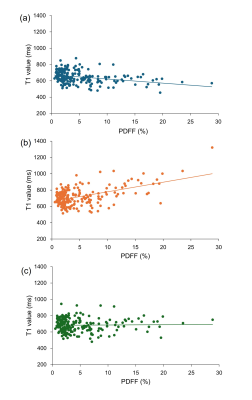 |
Computer Number: 66
2795. Value
of two-point Dixon fat-corrected Look-Locker T1 mapping on the
assessment of liver fibrosis in chronic liver disease with
hepatic steatosis
M. Higashi, M. Tanabe, U. Goerke, H. Imai, K. Ito
Yamaguchi University Graduate School of Medicine, Yamaguchi, Japan
Impact: 2D two-point Dixon fat-corrected Look-Locker T1
mapping is essential for the proper assessment of liver
fibrosis in patients with chronic liver disease under the
presence of substantial hepatic steatosis.
|
|
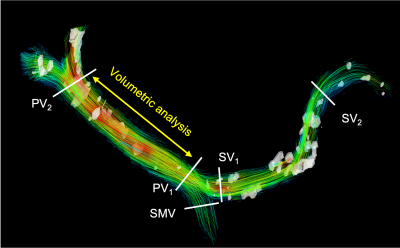 |
Computer Number: 67
2796. Risk
stratification of esophageal varices in patients with liver
cirrhosis using 4D Flow MRI
H. Huh, S. Park, C. Moon, J. Lee, M. Kwon, S. Heo, S. Kim,
S. Shin
Daegu-Gyeongbuk Medical Innovation Foundation, Daegu, Korea, Republic of
Impact: This study highlights 4D flow-based advanced
markers for assessing esophageal varices risk. These
findings support improved risk stratification methods that
may enhance clinical management for high-risk patients.
|
|
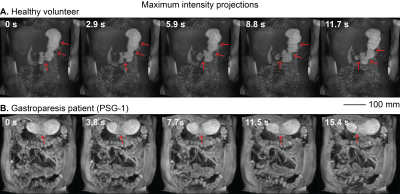 |
Computer Number: 68
2797. Surface
Modeling of Dynamic Contrast-Enhanced MRI Enables Individualized
Diagnosis of Gastric Dysmotility in Gastroparesis
X. Wang, F. Alkaabi, Y. Xia, C. Yang, Z. Liu
University of Michigan, Ann Arbor, United States
Impact: Our novel MRI-based technique enables precise
quantification of gastric motor dysfunctions, providing a
non-invasive tool for individualized and evidence-based
diagnosis of gastroparesis to inform tailored treatment for
potentially better patient outcomes.
|
|
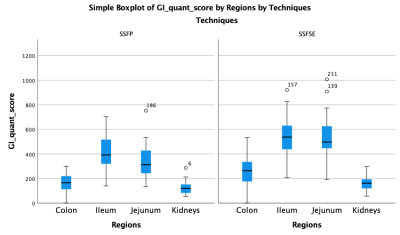 |
Computer Number: 69
2798. Comparing
Gastrointestinal (GI) Motility scoring using Cine T2-weighted
bSSFP and SSFSE Sequences in MR Enterography
E. Hussain, A. Loening, R. Patel, I. Naim, A. Syed, V. Sheth
Stanford University, Stanford, United States
Impact: A correction factor may be required for use of
SSFSE sequences for dynamic small bowel motility assessment
with GI Quant. Motility is a biomarker of inflammation in
patients with inflammatory bowel disease.
|
|
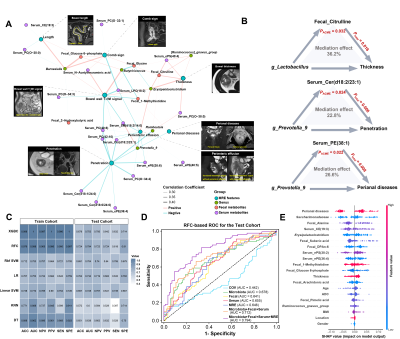 |
Computer Number: 70
2799. Linking
Gut Microbiota-Metabolite Profiles with MRE Features to Advance
a Multi-omics Diagnostic Model for Bowel Damage in Crohn’ s
Disease
L. Huang, J. Meng, R. Zhang, X. Shen, Y. Wang, S. Feng, X.
Li
The First Affiliated Hospital, Sun Yat-sen University, Guangzhou, China
Impact: This study bridges advanced MRE imaging with
microbial and metabolic insights, providing clinicians with
a more comprehensive diagnostic tool. It enables precise
risk stratification in CD, paving the way for targeted,
prognostic-driven interventions and more personalized
patient care.
|
|
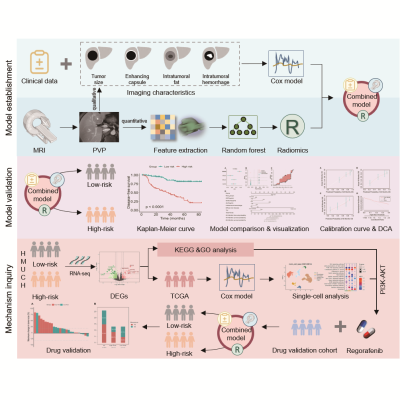 |
Computer Number: 71
2800. Combine
radiomics models and multi-omics data stratified patients with
AFPhigh - HCC Sensitivity to regorafenib.
F. Tiantian, Z. Yang
The Affiliated Cancer Hospital of Harbin Medical University, harbin, China
Impact: The
combined model based on clinical, imaging, and radiomics
data can predict the postoperative survival status of
patients. This model allows for the identification of a
subgroup of patients who are at relatively low risk and
responsive to regorafenib treatment.
|
|
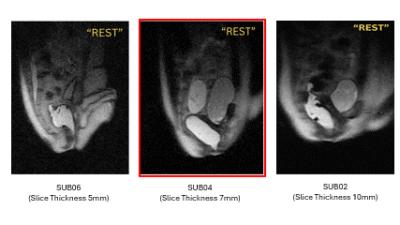 |
Computer Number: 72
2801. Upright
0.5T MR Proctography : an investigation into the repeatability
and reproducibility of pelvic floor measures during seated
defaecation
R. Sobhan, P. Glover, P. Gowland, R. Munyal, O. Mougin, C.
Clarke
University of Nottingham, Nottingham, United Kingdom
Impact: Upright
MR defaecating proctography (uMRDP) facilitates capturing
consistent pelvic floor (PF) metrices during seated
defaecation. Thus, uMRDP can substitute supine MRDP. The
non-ionising nature and complete PF coverage make it a
feasible PF disorder assessment tool, complementary to
fluoroscopic proctography
|
|
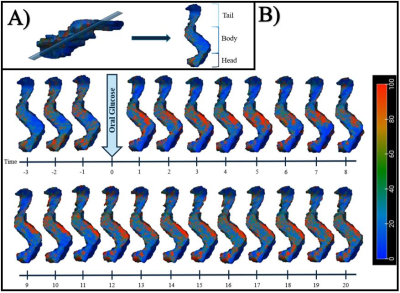 |
Computer Number: 73
2802. Free-breathing
quantitative blood oxygen level-dependent (qBOLD) MRI of the
healthy adult pancreas during oral glucose stimulation
A. Horner, M. Dominik Nickel, V. Khalilzad Sharghi, L.
Staimez, P. Vellanki, D. Reiter
Emory University School of Medicine, Atlanta, United States
Impact: Our results support the feasibility of a
free-breathing protocol for functional pancreatic imaging as
a more executable approach for patient populations,
providing improved resource efficiency, i.e., reduced
patient burden and lower processing costs compared to
current breath-hold techniques.
|
|
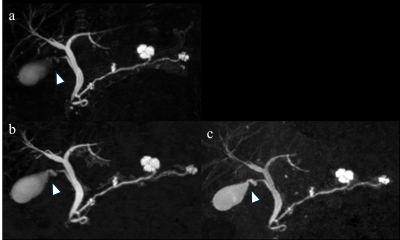 |
Computer Number: 74
2803. MRCP-CORE:
Novel Technique of Respiratory-Gated 3D-TSE MRCP Improving the
Visibility of Gallbladder with Concentrated Bile.
J. Tsuzaki, D. Ito, T. Nozaki, M. Hase, M. Arai, H. Mori, T.
Habe, H. Sakata, R. Tsukada, Y. Yamada, M. Jinzaki
Keio University School of Medicine, Tokyo, Japan
Impact: MRCP-CORE employs a centric k-space trajectory
and significantly shortens the echo time (TE), enabling
respiratory-gated 3D-TSE MRCP imaging without being affected
by concentrated bile. This approach is expected to
contribute to improved diagnostic accuracy for biliary
diseases.
|
|
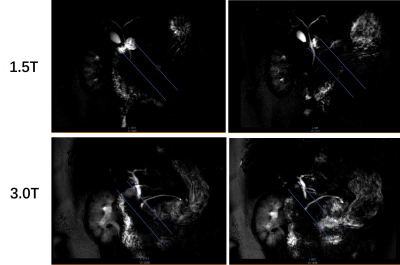 |
Computer Number: 75
2804. Does
cine-dynamic MRCP at 1.5T vs. 3.0T differ in noninvasively
assessing pancreatic exocrine function under physiological
conditions?
Q. Wu, J. Liu, D. Zheng, H. Xue
Peking Union Medical College Hospital, Beijing, China
Impact: This study demonstrated that the feasibility of
cine-dynamic MRCP for assessment of pancreatic exocrine
physiological function change at both 1.5T and 3.0T. The
frequency and length of pancreatic secretion observed shows
good agreement between 1.5T and 3.0T.
|
|
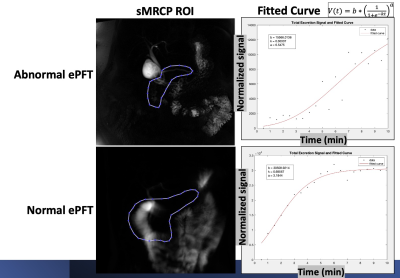 |
Computer Number: 76
2805. Novel
algorithm for quantification of pancreatic exocrine function
from Secretin-MRCP is concordant with endoscopic findings
A. Guimaraes, A. Streblow, K. Sharzehi, B. Foster, G. Cote,
C. Wyatt
OHSU, Portland, United States
Impact: This novel paradigm may be a more effective
comparator for ePFT in patients
|
The International Society for Magnetic Resonance in Medicine is accredited by the Accreditation Council for Continuing Medical Education to provide continuing medical education for physicians.